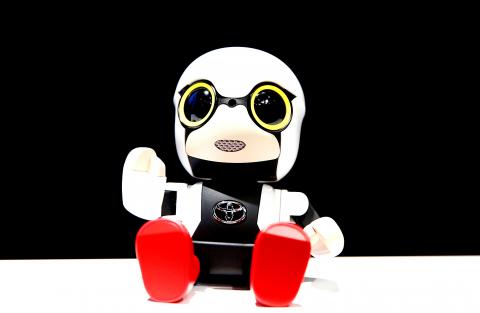Toyota Motor Corp took one giant leap for robot-kind by launching the first humanoid robot into space to converse with astronauts. Now, it is taking one small step toward commercializing robots for the masses.
Japan’s largest automaker is to begin selling a 10cm tall talking robot called Kirobo Mini across Japan early next year. Priced at ¥39,800 (US$393) and small enough to fit into a car cup holder, Toyota is billing Kirobo as capable of responding to human emotions while engaging in conversation and moving its head and hands.
Toyota is to position Kirobo as a communication partner developed for companionship just as surveys of Japanese consumers show a declining affinity for automobiles. One poll by Japan’s automakers association released in April found about 30 percent of respondents under age 30 had no interest in cars at all.

Photo: Reuters
The Toyota City, Japan-based automaker will try to leverage Kirobo’s capabilities to help make driving safer. The robot may shout “Oops!” when its owner slams on the brakes, start speaking to perk up a sleepy driver, and offer praise once it has arrived home after a long drive. Kirobo connects via Bluetooth to a smartphone app costing users ¥300 per month.
Toyota has pledged US$1 billion in investment over five years toward an artificial intelligence and robotics institute that is leading research efforts on areas including autonomous driving.
The funding going to the Toyota Research Institute is equal to what the company spent developing the first Prius hybrid, president Akio Toyoda said during a speech at the Paris Motor Show last week.
Kirobo is to start selling in Japan roughly a year and a half after Softbank Corp’s Pepper robot, which initially cost ¥198,000 along with a ¥14,800 per month service plan that gave users access to cloud-based voice recognition and an app store.
A larger version of Kirobo spent 18 months on board the International Space Station on a journey that ended in February last year.
Before returning to Earth, Kirobo became the first robot to speak in space, including with Japanese astronaut Koichi Wakata.

NOT JUSTIFIED: The bank’s governor said there would only be a rate cut if inflation falls below 1.5% and economic conditions deteriorate, which have not been detected The central bank yesterday kept its key interest rates unchanged for a fifth consecutive quarter, aligning with market expectations, while slightly lowering its inflation outlook amid signs of cooling price pressures. The move came after the US Federal Reserve held rates steady overnight, despite pressure from US President Donald Trump to cut borrowing costs. Central bank board members unanimously voted to maintain the discount rate at 2 percent, the secured loan rate at 2.375 percent and the overnight lending rate at 4.25 percent. “We consider the policy decision appropriate, although it suggests tightening leaning after factoring in slackening inflation and stable GDP growth,”

DIVIDED VIEWS: Although the Fed agreed on holding rates steady, some officials see no rate cuts for this year, while 10 policymakers foresee two or more cuts There are a lot of unknowns about the outlook for the economy and interest rates, but US Federal Reserve Chair Jerome Powell signaled at least one thing seems certain: Higher prices are coming. Fed policymakers voted unanimously to hold interest rates steady at a range of 4.25 percent to 4.50 percent for a fourth straight meeting on Wednesday, as they await clarity on whether tariffs would leave a one-time or more lasting mark on inflation. Powell said it is still unclear how much of the bill would fall on the shoulders of consumers, but he expects to learn more about tariffs

Greek tourism student Katerina quit within a month of starting work at a five-star hotel in Halkidiki, one of the country’s top destinations, because she said conditions were so dire. Beyond the bad pay, the 22-year-old said that her working and living conditions were “miserable and unacceptable.” Millions holiday in Greece every year, but its vital tourism industry is finding it harder and harder to recruit Greeks to look after them. “I was asked to work in any department of the hotel where there was a need, from service to cleaning,” said Katerina, a tourism and marketing student, who would

i Gasoline and diesel prices at fuel stations are this week to rise NT$0.1 per liter, as tensions in the Middle East pushed crude oil prices higher last week, CPC Corp, Taiwan (台灣中油) and Formosa Petrochemical Corp (台塑石化) said yesterday. International crude oil prices last week rose for the third consecutive week due to an escalating conflict between Israel and Iran, as the market is concerned that the situation in the Middle East might affect crude oil supply, CPC and Formosa said in separate statements. Front-month Brent crude oil futures — the international oil benchmark — rose 3.75 percent to settle at US$77.01